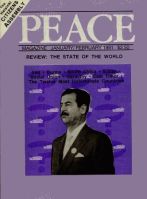
Peace Magazine Jan-Feb 1991, page 7. Some rights reserved.
Search for other articles by Leonard V Johnson here
U.S. President George Bush blundered into a dilemma with his hasty and unilateral military response to the invasion of Kuwait. At stake now are scores of thousands of human lives, the prestige and perhaps the future of Mr. Bush's presidency, the authority of the United Nations Security Council, and much, much more. By casting its lot with Mr. Bush, the Mulroney government is ready to sacrifice Canadian lives in a war that no thinking person wants and that need not happen. This war, if it occurs, will not be worth a single life, Canadian or otherwise.
One horn of Mr. Bush's dilemma is appeasement and retreat, with all of the political consequences that would entail. Unless some negotiating space can be opened up, permitting a face-saving compromise acceptable to both sides, then war, the other horn of the dilemma, will continue to be seen by some as the better choice. The best prospect for negotiation lies with the United Nations, recourse to which would distribute responsibility and take some of the onus off Mr. Bush, who has no diplomatic maneuvering room left.
The war option is not as good as its advocates would have us believe. Although the anti-Saddam coalition might well drive the Iraqi forces out of Kuwait, albeit at considerable cost, unless those forces were destroyed they could repair their losses and return another day, perhaps armed with nuclear weapons. There is thus slight chance that the war would be limited to Kuwaiti territory. If not, then the war could become a protracted regional war involving all of the states in the Arabian peninsula, including Israel. Such a war could destroy the sources of the oil on which Western economies depend, cost hundreds of thousands of lives, and destroy governments. Nor is success even assured: the Americans, in getting their forces to the Gulf in such a short time, have already done what they do best.
Between the horns of the dilemma lies stalemate, with erosion of the anti-Saddam coalition and continuing loss of political support for the intervention. Even success-Iraqi withdrawal from Kuwait-would leave Saddam in power with his forces intact, but threats of reparations and war crimes tribunals make capitulation increasingly unlikely. Dictators are not easily cowed when time is on their side, nor are they open to reason when their choices are limited to death in a final battle or death by hanging.
Despite all the difficulties it entails, the only course open is to continue to apply sanctions, intensifying them if possible, while exploring all avenues toward a negotiated outcome. The United Nations must be accorded full scope to act as it was intended to act, with any ultimate decision to employ force made by the Security Council in accordance with the Charter. In the meantime, there should be a moratorium on threats of war and talk of its inevitability: war is not yet inevitable, nor will it become inevitable until George Bush issues the orders to attack.
Major-Gen. (Ret.) Leonard V. Johnson is chair of Project Ploughshares and the Canadian Pugwash Group.

Peace Magazine Jan-Feb 1991, page 7. Some rights reserved.
Search for other articles by Leonard V Johnson here